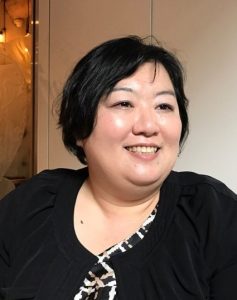In 2004, at 30 years old, Miho Katagi was diagnosed with ovarian cancer (Mucinous, Stage Ia). At the time, this mother of a 2-year-old son knew nothing about ovarian cancer and felt anxiety every day. During this time, she found support and encouragement from other ovarian cancer patients she met online.
In 2006, when she found out that there were no anti-cancer drugs available and approved in Japan to effectively treat ovarian cancer patients, she and Mami Ikematsu—with the support of many other ovarian cancer survivors and their families—decided to form the first and only support group specifically for ovarian cancer patients in Japan. And, since not being able to receive treatment will take away a patient’s smile, they called the support group “SMILEY,” wanting to give patients reasons to feel more at ease and to smile. (Sadly, 2 weeks after SMILEY was formed, Mami Ikematsu died.)
Because patients and families considered the time lag between drug approval in other countries and approval for use in Japan to be a severe survival disadvantage for Japanese patients, the group appealed to Japanese parliamentarians and the Ministry of Health, Labor and Welfare to reduce this so-called “drug lag”—a serious social problem. They lobbied and even appealed through mass media to solve this problem and remove the disadvantage. As a result, the Japanese government started reducing the “drug lag” times, and drugs for ovarian cancer, as well as many other diseases, have been developed and approved more quickly. SMILEY’s activities caused an increase in the number of drug examiners, and the Ministry of Health, Labor and Welfare held a meeting to promote drug development, resulting in 180 drugs being approved or progressing for development.
Since 2013, SMILEY has participated in World Ovarian Cancer Day and in the awareness and educational events of the Globe-athon to End Women’s Cancers. And, in 2018, SMILEY supported the Eriko Aotani Patient–Caregiver Symposium at the IGCS Global Meeting in Kyoto, which was an opportunity for many Japanese patients and supporting groups to enhance their knowledge about gynecological cancers.
Following are some of her past and present advocacy engagements:
- 2009-2014—Member of Institutional Review Board and of Conflict of Interest Committee of Japanese Gynecologic Oncology Group (JGOG)
- 2009-present—Member of Institutional Review Board of Gynecologic Oncology Trial and Investigation Consortium of North Kanto (GOTIC)
- 2011—Member of Ministry of Health, Labor and Welfare Council Committee, which considered revision of the Pharmaceutical Affairs Law
- 2012—External Member of Center for Cancer Control and Information Service of National Cancer Center
- 2014—Member of Ministry of Health, Labor and Welfare Council Committee, which considered measures to prevent accidents and deaths caused by use of counterfeit medicines (imported medicines that are not approved in Japan)
- 2015-2020—Board Member of All Tohoku Clinical Trial Review and Audit Organization (ACTIVATO)
Through SMILEY and other advocacy work, Miho will continue to initiate and participate in activities that benefit “all ovarian cancer patients,” knowing that such action will give patients reasons to Smile.
